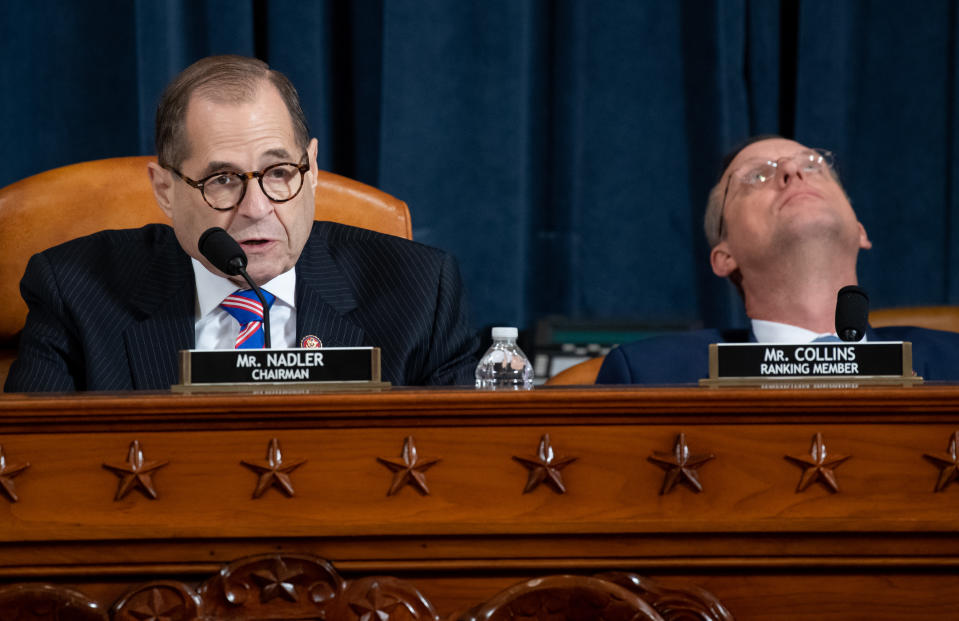Boredom, not public persuasion, is the goal in Judiciary phase of impeachment
WASHINGTON — The dullness was the point.
A panel of four legal scholars testified Wednesday before the House Judiciary Committee in the impeachment inquiry of President Trump. It was an intriguing day for “eggheads,” as one Democratic aide put it, but for much of the country and even many members of Congress, the references to century-old documents and to kings and powdered wigs amounted to a powerful soporific agent.
“My god this hearing is boring,” tweeted Josh Holmes, an adviser to Senate Majority Leader Mitch McConnell, R-Ky., just one hour into the day-long impeachment hearing Wednesday.
“What in sam hell do Democrats think they are accomplishing by soliciting three left-wing professors to conclude Trump should be impeached?” Holmes added.
TV pundits also expressed skepticism. “Do you see this moving the needle at all? Is this having any effect on voters?” CNN’s Jake Tapper asked his panel.
But public persuasion is not the primary goal of Democrats in this particular phase, multiple House Democratic aides told Yahoo News.
“It’s the wrong question,” one House Democratic staffer said inside the Capitol.
Public sentiment has barely shifted since House Speaker Nancy Pelosi, D-Calif., announced the impeachment inquiry in late September. Around 50 percent of Americans continue to support impeachment, and just under that still oppose it. That’s partly due to entrenched political polarization, and partly driven by the split-screen reality that grips much of the country, with Republicans able to concoct their own narrative on Fox News and other corners of the conservative media echo chamber.

In addition, the House Judiciary Committee might be uniquely designed — especially in the modern age — to thwart efforts at persuasion, let alone coherent exchanges of questions and answers.
The 41-member committee is a snake pit of self-promoters and political brawlers. It’s a sprawling, unruly and often chaotic venue that lends itself to viral moments but is much less suited to laying out a narrative about what exactly the president did in regards to Ukraine and why it might be impeachable.
But impeachment proceedings go through Judiciary, mostly based on historical precedent.
Wednesday’s hearing, which dwelled on the intentions of the Founding Fathers, amounted to pumping sleeping gas into a room that might otherwise have degenerated into shouting matches or gotcha moments designed to be tweeted and replayed on cable TV. Those moments did happen, but they were overwhelmed by a largely low-energy affair.
And if there’s anything that Pelosi has emphasized, it’s that she wants impeachment to be a sober and restrained process.
“Believe me, I am very prayerful about this. This is a heavy decision to go down this path,” Pelosi said that day in September in which she announced the inquiry.
So if changing public sentiment beyond a gridlocked split decision is going to be a slow, grinding and possibly fruitless affair, Democrats believe that they can’t, at the bare minimum, let the inquiry become a circus.

There are, after all, other phases of the impeachment process in which to try to shift public opinion. The witness hearings in the Intelligence Committee over the past few weeks were one part of the persuasion effort. That committee is half the size of Judiciary, and the rules allowing for 45-minute question blocs allowed Intelligence Chair Adam Schiff, D-Calif., and his staff lawyer Daniel Goldman to lay out a set of facts.
If the House does end up approving articles of impeachment, a Senate trial would be the next place where Democrats would have the ability to prosecute the case against Trump.
As the Judiciary Committee’s debacle of a hearing in mid-September with former Trump political adviser Corey Lewandowski showed, Judiciary isn’t such a venue. Lewandowski toyed with the committee and yielded little information.
Shortly after that hearing, Pelosi announced the start of the impeachment inquiry and Schiff was put in charge, shifting the center of gravity on impeachment away from Judiciary Chair Jerry Nadler, D-N.Y., who had conducted most of the hearings looking into Russian meddling in the 2016 election.
Now that the Intelligence Committee investigation is concluded, the goal for Democrats as the inquiry moves through Judiciary is to “do no harm,” as the Democratic staffer put it.
That meant that committee members like Rep. Matt Gaetz, the Florida Republican who has made himself a star through outrage and political stunts, were left to complain that they were “dying” of boredom. Republicans made similar criticisms of hearings on the Intelligence Committee, but in those hearings they were able to engage fact witnesses about what happened in the Ukraine affair.
On Wednesday, Republicans searching for material to push around on social media resorted to characterizing a stray comment by one of the panelists as an “attack” on the president’s 13-year-old son, Barron.

“The Constitution says there can be no titles of nobility, so while the president can name his son Barron, he can’t make him a baron,” said Pamela Karlan, a Stanford law professor. Her point was that the president is not a king in the American system of government, and that there are no titles of nobility.
Another of Trump’s sons, Donald Trump Jr., deemed this comment by Karlan to be “vile.” The Trump campaign followed with a statement denouncing the remark. And Gaetz brought up the comment to Karlan during the hearing, saying it made her look “mean.”
Gaetz got a rise out of Karlan, and she apologized moments later for “getting a little overheated.”
But debates over legal theories couldn’t sustain a raised temperature in the room very long.
Plus, the room was freezing. “This is the coldest hearing room in the world,” Collins, the top Republican on the panel, complained at one point.
Collins was right. The House Ways and Means Committee hearing room is apparently kept colder than most rooms by Capitol Police, according to Chad Pergram, a veteran Capitol Hill reporter for Fox News, because it is a backup House chamber that could be used in case of emergency if the Capitol is damaged or compromised in some way.
“As a security measure, they keep the temperature cold here. If there were a chemical attack, the molecules move more slowly, in the cold,” Pergram tweeted. “The temperature retards deployment of the agent.”
_____
Download the Yahoo News app to customize your experience.
Read more from Yahoo News:
How Chief Justice John Roberts would lead the Senate impeachment trial
Top Navy SEAL faces uncertain future after Trump intervention
As Supreme Court weighs DACA, Trump pushes fiction about 'hardened criminals'
PHOTOS: The provocative new book 'Independent Mysteries' explores the sense of 'intimate distance'



